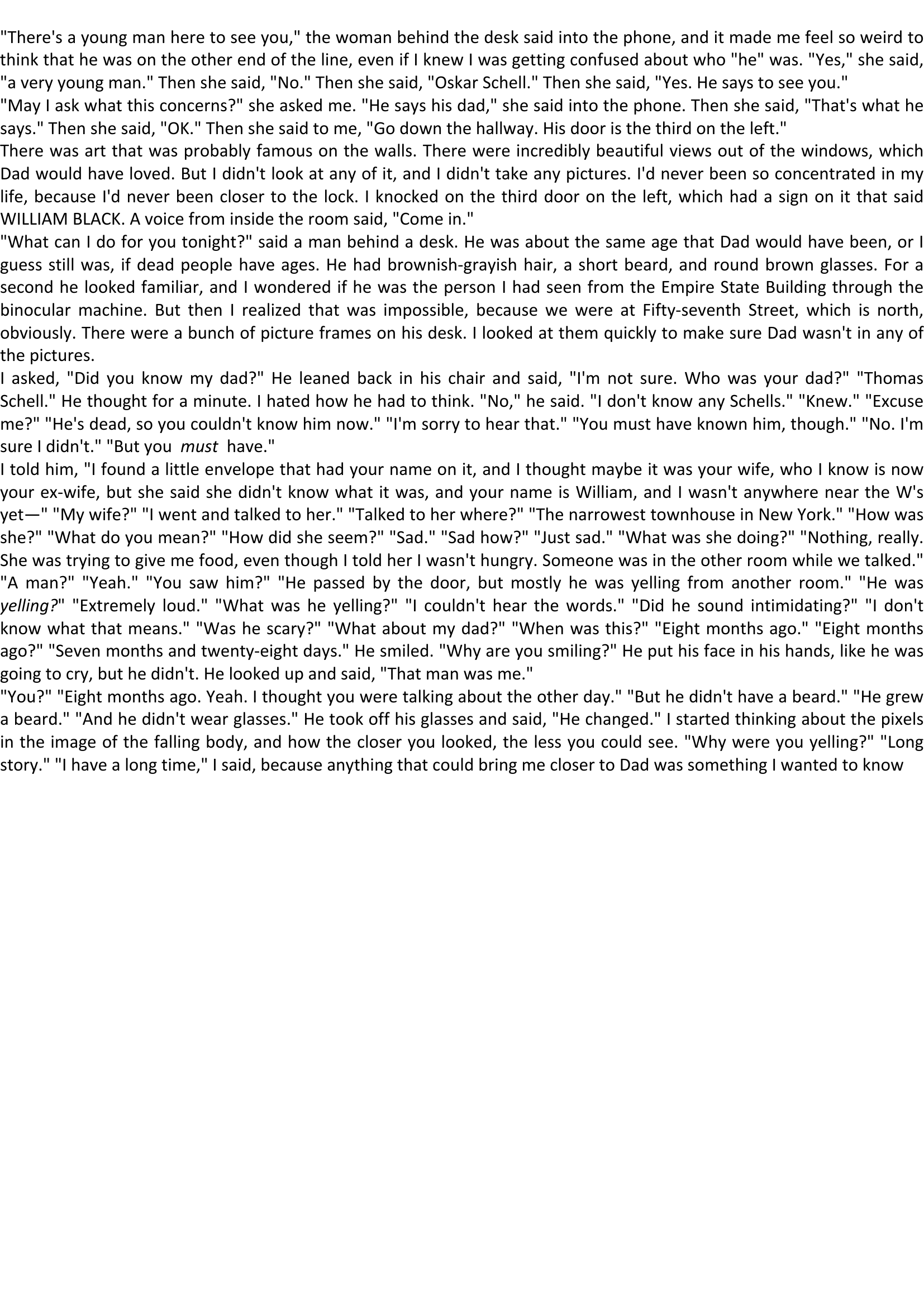"I wanted to hurt him.
Publié le 06/01/2014

Extrait du document
«
"There's
ayoung manhere tosee you," thewoman behindthedesk saidintothephone, anditmade mefeel soweird to
think thathewas onthe other endofthe line, even ifIknew Iwas getting confused aboutwho"he" was.
"Yes," shesaid,
"a very young man."Thenshesaid, "No." Thenshesaid, "Oskar Schell." Thenshesaid, "Yes.
Hesays tosee you."
"May Iask what thisconcerns?" sheasked me."Hesays hisdad," shesaid intothephone.
Thenshesaid, "That's whathe
says." Thenshesaid, "OK." Thenshesaid tome, "Go down thehallway.
Hisdoor isthe third onthe left."
There wasartthat wasprobably famousonthe walls.
There wereincredibly beautifulviewsoutofthe windows, which
Dad would haveloved.
ButIdidn't lookatany ofit,and Ididn't takeanypictures.
I'dnever beensoconcentrated inmy
life, because I'dnever beencloser tothe lock.
Iknocked onthe third dooronthe left, which hadasign onitthat said
WILLIAM BLACK.A voice frominside theroom said,"Come in."
"What canIdo for you tonight?" saidaman behind adesk.
Hewas about thesame agethat Dadwould havebeen, orI
guess stillwas, ifdead people haveages.
Hehad brownish-grayish hair,ashort beard, andround brown glasses.
Fora
second helooked familiar, andIwondered ifhe was theperson Ihad seen from theEmpire StateBuilding throughthe
binocular machine.Butthen Irealized thatwasimpossible, becausewewere atFifty-seventh Street,whichisnorth,
obviously.
Therewereabunch ofpicture framesonhis desk.
Ilooked atthem quickly tomake sureDadwasn't inany of
the pictures.
I asked, "Didyouknow mydad?" Heleaned backinhis chair andsaid, "I'mnotsure.
Whowasyour dad?" "Thomas
Schell." Hethought foraminute.
Ihated howhehad tothink.
"No,"hesaid.
"Idon't know anySchells." "Knew.""Excuse
me?" "He'sdead, soyou couldn't knowhimnow." "I'msorry tohear that." "Youmust haveknown him,though." "No.I'm
sure Ididn't." "Butyou must have."
I told him, "Ifound alittle envelope thathadyour name onit,and Ithought maybeitwas your wife, whoIknow isnow
your ex-wife, butshe said shedidn't knowwhatitwas, andyour name isWilliam, andIwasn't anywhere neartheW's
yet—" "Mywife?" "Iwent andtalked toher." "Talked toher where?" "Thenarrowest townhouse inNew York." "Howwas
she?" "What doyou mean?" "Howdidshe seem?" "Sad.""Sadhow?" "Justsad." "What wasshedoing?" "Nothing, really.
She was trying togive mefood, eventhough Itold herIwasn't hungry.
Someone wasinthe other roomwhilewetalked."
"A man?" "Yeah." "Yousawhim?" "Hepassed bythe door, butmostly hewas yelling fromanother room.""Hewas
yelling? "
"Extremely loud.""What washeyelling?" "Icouldn't hearthewords." "Didhesound intimidating?" "Idon't
know whatthatmeans." "Washescary?" "Whataboutmydad?" "When wasthis?" "Eight months ago.""Eight months
ago?" "Seven months andtwenty-eight days."Hesmiled.
"Whyareyou smiling?" Heput hisface inhis hands, likehewas
going tocry, buthedidn't.
Helooked upand said, "That manwasme."
"You?" "Eightmonths ago.Yeah.
Ithought youwere talking abouttheother day.""Buthedidn't haveabeard." "Hegrew
a beard." "Andhedidn't wearglasses." Hetook offhis glasses andsaid, "Hechanged." Istarted thinking aboutthepixels
in the image ofthe falling body,andhow thecloser youlooked, theless youcould see."Why wereyouyelling?" "Long
story." "Ihave along time," Isaid, because anything thatcould bringmecloser toDad wassomething Iwanted toknow.
»
↓↓↓ APERÇU DU DOCUMENT ↓↓↓
Liens utiles
- LUI [Him]. (résumé)
- Meru (mont), dans la cosmologie indienne, montagne mythique de l'Him?laya, censée être l'axe du monde matériel.
- le 2 ED 5 Lil de PACESé rsit 2011-2012 E1 ve ni S U ie U CE him A 12 P c -20 Bio e 2011 D5
- PACES 2011-2012 ire ita ers ED4 UE1 ni v e u - 2012 E1 é Biochimie nn U A 1 01 - Glucidesie 2 him Lipides oc Bi ES AC P 8 novembre au 15 novembre 2011 1 Soit le 1-palmitoyl-2-linoléyl-3-stéaryl-glycérol : ire 1- Représentez sa structure ita ?
- Robinson Crusoe (extrait) Daniel Defoe (...) In a little time I began to speak to him, and teach him to speak to me; and, first, I made him know his name should be Friday, which was the day I saved his life.


